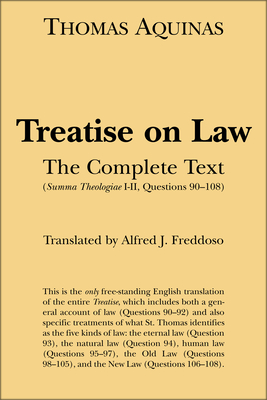Treatise on Law: The Complete Text

Treatise on Law: The Complete Text
St. Thomas's account of law is firmly embedded within a general moral theory that begins with a rich conception of human flourishing, i.e., the good for human beings (Questions 1-5). This good consists, first and foremost, in our ultimate and intimate union with the Persons of the Blessed Trinity - a union that in our present state we can grasp intellectively and pursue affectively only with God's supernatural assistance. It is within this framework that we order our loves and pursue the more proximate goals they open up to us as human beings in this life. Given the appropriate goals, the next question is how we can get from where we are, in the grips of the consequences of Original Sin, to where we want to be. The answer is: by means of (a) human actions that are good, i.e., rightly ordered toward our ultimate end and (b) the habits that these actions either engender or flow from. In analyzing human actions (Questions 6-21) and their relation to the passions (Questions 22-48), St. Thomas gives a general account of what he calls the 'intrinsic principles' of human actions and their associated habits - both virtues (Questions 49-70) and vices (Questions 71-89). It is only then that he turns to what he calls the 'extrinsic principles' of good human actions, viz., law (Questions 90-108) and grace (Questions 109-114).
According to St. Thomas, law, far from supplanting virtue as a basic principle of action, serves as an independent principle of action that complements virtue and is itself capable of being factored into practical deliberation. The reason is that all of God's
precepts, prohibitions, and punishments are aimed at promoting the good of the whole universe and, more particularly, the good for human beings, both individually and within the various forms of socia
PRP: 167.40 Lei
Acesta este Prețul Recomandat de Producător. Prețul de vânzare al produsului este afișat mai jos.
150.66Lei
150.66Lei
167.40 LeiLivrare in 2-4 saptamani
Descrierea produsului
St. Thomas's account of law is firmly embedded within a general moral theory that begins with a rich conception of human flourishing, i.e., the good for human beings (Questions 1-5). This good consists, first and foremost, in our ultimate and intimate union with the Persons of the Blessed Trinity - a union that in our present state we can grasp intellectively and pursue affectively only with God's supernatural assistance. It is within this framework that we order our loves and pursue the more proximate goals they open up to us as human beings in this life. Given the appropriate goals, the next question is how we can get from where we are, in the grips of the consequences of Original Sin, to where we want to be. The answer is: by means of (a) human actions that are good, i.e., rightly ordered toward our ultimate end and (b) the habits that these actions either engender or flow from. In analyzing human actions (Questions 6-21) and their relation to the passions (Questions 22-48), St. Thomas gives a general account of what he calls the 'intrinsic principles' of human actions and their associated habits - both virtues (Questions 49-70) and vices (Questions 71-89). It is only then that he turns to what he calls the 'extrinsic principles' of good human actions, viz., law (Questions 90-108) and grace (Questions 109-114).
According to St. Thomas, law, far from supplanting virtue as a basic principle of action, serves as an independent principle of action that complements virtue and is itself capable of being factored into practical deliberation. The reason is that all of God's
precepts, prohibitions, and punishments are aimed at promoting the good of the whole universe and, more particularly, the good for human beings, both individually and within the various forms of socia
Detaliile produsului










